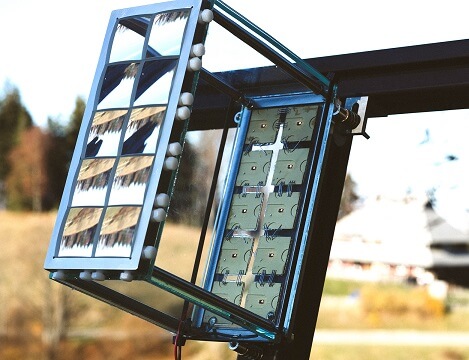The Germany-based Fraunhofer Institute for Solar Energy Systems (ISE) is claiming a new world record for solar photovoltaic module efficiency, 41.4%.
According to ISE, the basis for this latest achievement lies in special multi-junction solar cells and the “perfect interplay” between the cells and the module optics. A consortium of research institutes and industry partners from Germany, Italy, Spain and France conducted the research through an EU-funded project, CPVMatch.
“In CPVMatch, we have addressed all production steps for concentrator modules starting from the materials, through cell fabrication and production systems, and up to the challenges facing module manufacturing,” reports Dr. Gerald Siefer, project head and group leader of III-V Cell and Module Characterization at Fraunhofer ISE.
The researchers were able to improve the design of high-concentration modules, primarily by modifying the optics and making use of achromatic lenses. The combination of four-junction solar cells with achromatic lenses has led to the new record efficiency of 41.4% for a 122 cm² module.
ISE explains that high-concentration photovoltaic systems offer renewable electricity with the highest conversion efficiency and thus a correspondingly low use of resources, especially in regions with high direct normal irradiance. In this technology, multi-junction solar cells, based on III-V compound semiconductors, are used. In these solar cells, several thin subcells are stacked on top of each other in order to convert the solar irradiance more efficiently. Optical lenses concentrate the incoming sunlight onto the miniature sized solar cells, and the modules are mounted on a two-axis tracking system that follows the sun’s path during the day.
“We are extremely pleased about these results that pave the way for further efficiency increases in the concentrator technology,” says Dr. Andreas Bett, institute director of Fraunhofer ISE. “Photovoltaics is booming worldwide, and we see great potential for this particularly efficient module technology. It significantly decreases the use of resources for energy conversion per unit area and thus contributes to more sustainability.”




